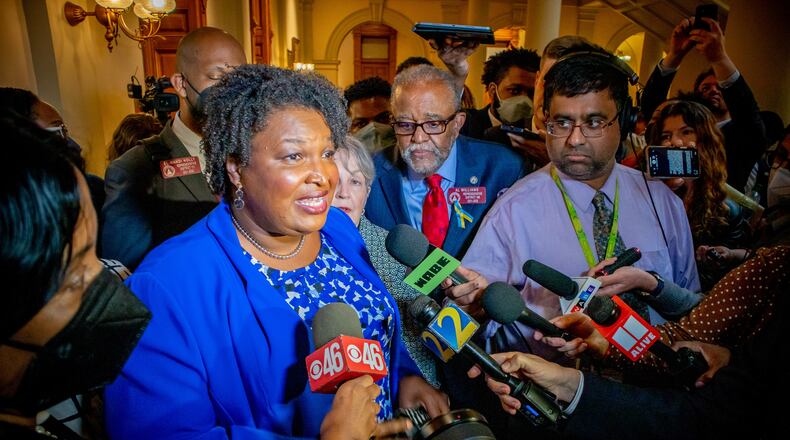Surrounded by cheering supporters, Stacey Abrams formally qualified Tuesday to run for Georgia governor, embarking on a new campaign with much the same message she delivered during her last bid four years ago.
“I’m running to be the leader of all of Georgia, even those who don’t like me, because I believe that expanding Medicaid serves us all,” Abrams said. “Defending our right to vote serves us all. Ensuring access to education, whether you live in rural communities or in the city, serves us all.”
The Democrat called Gov. Brian Kemp and other Republicans who have refused to expand the Medicaid program “callous” as she vowed to “fully and permanently fund education and build economic development plans that work for all Georgians.”
“Sadly, those are still the issues we need to focus on,” Abrams said. “The last four years of inaction and ineptitude by the current governor means that I’m simply trying again to do what’s right for Georgia. And I believe this time we will get it done.”
Abrams centered her 2018 campaign on similar themes, promising to expand access to health care, education and economic opportunity. But she faces a very different political dynamic than she did four years ago, when her bid ended in a narrow defeat to Kemp.
Back then, she contended with a nasty Democratic primary battle and ceaseless questions about whether left-leaning candidates can win top Georgia offices. Now she’s the all-but-certain Democratic nominee and the architect of a decade-long strategy that culminated in statewide victories.
The scene at the Capitol on Tuesday, the second day of the qualifying period, offered a glimpse at Abrams’ standing. Word of her arrival brought parts of the Gold Dome to a standstill, as allies and onlookers crowded outside a second-floor elevator.
When she emerged, journalists and state legislators held smartphones aloft to document her every move. Four years ago, she was a rising star in Democratic politics. Now she’s a household political name.
She’s also benefiting from brutal Republican infighting over former President Donald Trump, whose name she avoids mentioning. Kemp is facing a Trump-backed primary challenge from former U.S. Sen. David Perdue, fueling an internal divide that’s dominated the campaign.
Abrams’ prominence hurts, too. Georgia Republicans have spent the past four years making her their top target. At rowdy rallies and upscale donor gatherings, in TV ads and social media messages, GOP candidates have linked Abrams to every hated proposal.
She’s viewed by the GOP as such a threat that both Kemp and Perdue have tried to unite the party by claiming only they can defeat Abrams and block what they say is her eventual bid for the White House.
Kemp, who notes he’s the only Republican who has actually bested her, released an immediate statement panning his old rival’s “woke politics.”
“Stacey Abrams may see the Governor’s Mansion as the next steppingstone on her way to the White House, but Georgians won’t be fooled,” campaign spokesman Tate Mitchell said.
“Gov. Kemp will continue to run on a record of success putting Georgians first and stop Stacey Abrams from becoming our governor — and our next president,” Mitchell said.
During her remarks to reporters, Abrams mentioned expanding Medicaid no fewer than six times, underscoring her focus on an issue that has dominated Georgia Democratic campaigns since then-Gov. Nathan Deal rejected expanding the program because he said it would be too costly in the long run.
Abrams must also wrestle with other political headwinds. President Joe Biden’s approval ratings complicate the electoral landscape for Democrats, and the economic uncertainty stemming from supply-chain issues and Russia’s invasion of Ukraine has helped fuel inflation.
“The reality is that we are facing challenges. We are facing economic challenges. But people are also anxious and depressed, and we need a leader who acknowledges the legitimacy of their fears and their feelings,” she said.
“But we also need a leader who has the vision for what comes next. And I have both,” Abrams added. “And instead of catering to the powerful or to an ideological group, I’m running to be the leader of all of Georgia.”
About the Author
The Latest
Featured




